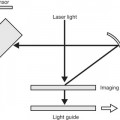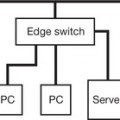10 Picture Archiving and Communication Systems (PACS)
| PACS is a method of storing images in a digital format. Once stored they can be sent to different parts of the hospital and to the wider medical community. Many manufacturers produce systems to enable the transfer of information and the systems they produce contain some or all of the following: |
| Image Identification |
• Either a barcode reader or a touch screen for patient identification
• Either a barcode reader or a touch screen for cassette identification
|
| This can either be: |
• Downloaded from the central hospital computer or appropriate imaging modality
• Keyed in using the computer keyboard or
• Directly read from a bar code.
Reporting Consoles
(Reporting consoles allow instant access to diagnostic images, allowing the decision to be taken immediately as to whether or not additional projections will be required before the patient leaves the department. In addition, current and archived images and previous reports can be displayed alongside each other to give a full clinical picture of the patient’s condition prior to reporting)It is possible to change the image presentation on the monitor with regard to:
• Viewing several images together
• Viewing an animated sequence of images
• Tonal conversion which is the selection of the appropriate contrast and density for the anatomical region under investigation
• Spatial frequency modification which allows the selective manipulation of an image to eliminate ‘blurring’ or contrast disparity
• Edge enhancement as the name suggests, more clearly defines the outline of various bones or organs
• Magnification allows different parts of the image to be magnified although some systems do not allow the magnified image to be recorded on film
• Measurement, rotation and image reversal are all possible and in some instances, the operator is able to manipulate the image to produce three dimensional images providing the appropriate software and images are present
• Sound reporting is the means of dictating and then saving an oral report by using a telephone headset. The recording can then be digitised and stored with the appropriate image. The recording can then be archived, transmitted or replayed at a later date
Remote Consoles
• Viewing stations to retrieve images from the intranet for internal staff
• Viewing stations to retrieve information from the internet for external staff
• The consoles can be sited throughout the hospital in intensive care units, theatres, accident and emergency departments, teaching units, etc.
• The images can be displayed alongside the reports and additional information, e.g. exposure factors, can also be displayed
• The use of these consoles can save time as the manual retrieving, transporting and copying of films is no longer required
Central Storage
• A Web server with a database to store the image
Stay updated, free articles. Join our Telegram channel

Full access? Get Clinical Tree







